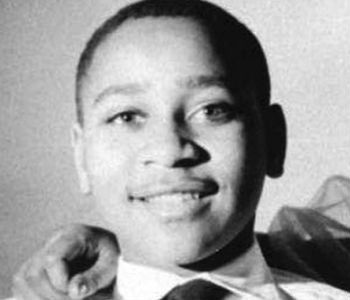“I hear a whistling through the water.
Little Emmett won’t be still.
He keeps floating round the darkness,
Edging through the silent chill.
Tell me, please,
That bedtime story of the fairy River Boy
Who swims forever, deep in treasures,
Necklaced in a coral toy.“
To his mother, Mamie Carthan, he caused a painful birth. To the rest of his family he was a cocksure and debonair boy, born out of timing. They all agree that he was very mature for his fourteen short years he spent on Earth. Till was raised by women; his mother and grandmother, in a time when segregation and hate was the law. However, to the cowards that murdered life of Emmett Till he was another ‘strange fruit’, deserving to be cut down!

As Till was about to embark on his trip from Chicago to Mississippi his mother cautioned him about how he should behave ‘in front of whites in the South’. Meanwhile, Till, born a freethinker, with the soul of a rebel had imagined things differently. He had envisioned something bigger; an integrated America, even in the Segregated South. His mother later remarked that Till “did not know his own limitations at times”. He had brought with him a picture of how things were back in his hometown of South Side Chicago; a picture of blacks and whites living together, he had brought hope.
Emmett Till’s crime was that he flirted with Carolyn Bryant, a white woman. He may have touched her hand as he paid for his bubble gum in the grocery store she ran. Till, who was a stutterer was known to whistle to help him pronounce words starting with the letter ‘b’. Bryant was so upset at what she thought was a pass at her, that she left the store to retrieve a pistol from her car. Till escaped her wrath, but later faced the wrath of her husband. After all, this account made his crime punishable by death.
Kidnapped, beaten repeatedly, shot and maimed, his remains were found days later in the Tallahassee River swollen and disfigured ‘weighted to the fan blade, which was fastened around his neck with barbed wire’. During the five day trial a prosecuting attorney remarked that what “Till did was wrong, but it warranted a spanking, not murder”. The suspects, Roy Bryant and his brother J. W. Milam, were acquitted of his murder after the jury in the case deliberated for exactly one hour and seven minutes. The men later admitted to his murder and were never brought to justice.
‘Well, what else could we do? He was hopeless. I’m no bully; I never hurt a nigger in my life. I like niggers—in their place—I know how to work ’em. But I just decided it was time a few people got put on notice. As long as I live and can do anything about it, niggers are gonna stay in their place. Niggers ain’t gonna vote where I live. If they did, they’d control the government. They ain’t gonna go to school with my kids. And when a nigger gets close to mentioning sex with a white woman, he’s tired o’ livin’. I’m likely to kill him. Me and my folks fought for this country, and we got some rights. I stood there in that shed and listened to that nigger throw that poison at me, and I just made up my mind.
‘Chicago boy,’ I said, ‘I’m tired of ’em sending your kind down here to stir up trouble. Goddam you, I’m going to make an example of you—just so everybody can know how me and my folks stand.’
J. W. Milam, Look magazine, 1956
‘If the facts as stated in the Look magazine account of the Till affair are correct, this remains: two adults, armed, in the dark, kidnap a fourteen-year-old boy and take him away to frighten him. Instead of which, the fourteen-year-old boy not only refuses to be frightened, but, unarmed, alone, in the dark, so frightens the two armed adults that they must destroy him…. What are we Mississippians afraid of?’
William Faulkner, “On Fear”, 1956
Till’s murder, funeral, and the trial that ensued aroused much suspicion of the idea of justice, especially from the media and several religious organizations. His ordeal not only inspired the Civil Rights Movement but also several other important works including the Civil Rights Act of 1957, Langston Hughes’“Mississippi – 1955”, Rod Serling‘s “Noon on Doomsday”, James Baldwin‘s “Blues For Mister Charlie”, Bob Dylan‘s “The Death of Emmett Till”, and even later Toni Morrison‘s “Dreaming Emmett”.
Emmett Till’s voice deserves to be heard loud and clear in a 21st century America; an America that has backpedalled on her promises and has betrayed her citizenry as the urban youth still lay on the altar as sacrificial lamb. The Emmett Tills of our day are the Trayvon Martins, but why do we continue to allow unjust laws to destroy families and communities? How many mothers will have to weep because of stories we refuse to tell? What would Emmett say from the grave if we could hear him today? Would he shriek in pain like he did in 1955? Would he say ‘my murder was in vain’?
Leave a Reply